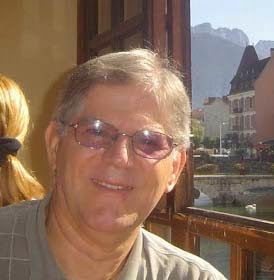 by Madeleine Kando
by Madeleine Kando
A few days ago I did an experiment. I googled the keyword 'self-confidence'. Aside from one pitiful wikepedia entry with some factual information, all I could find was innumerable advise on how to improve, increase or build self-confidence and its counterpart, how to decrease, beat, avoid or overcome self-consciousness.
In general, being confident about something means being certain that it is correct. So does self-confidence mean being certain that YOU are correct?As a child I liked having internal conversations with myself, pretending that I was 2 people. For example: I argued that it was good that my family had left Communist Hungary to come to the West. My other self argued that if we had stayed we could have learned Hungarian and we would not have turned ourselves into political refugees. Does that mean that I was never sure whether I was correct? Does this constitute a lack of self-confidence?
Self-confidence is also having faith in one's own abilities, but the danger of being too self-confident is that it makes you think that you are correct when you are not. How can you improve yourself when you are blind to your own mistakes?
And then there is the unpleasant relationship between self-confidence and self-consciousness. I am fairly confident in my own abilities but when it comes to public speaking for instance, I am so conscious of myself that I become speechless, which poses a slight problem while delivering a public speech.
Very self-confident people have a total unawareness of themselves, especially their own shortcomings. But to tell you the truth I see many positive aspects in being less confident and more conscious of yourself. Here are a few: being less self-confident gives you the ability to listen and learn from others. It means having self-criticism which results in a more objective view of the world. It widens your perspective by embracing other points of view.
Self-confidence should be a temporal, ever changing state of mind, based on what you have accomplished, not based on who you are. You have an A in school, your confidence goes up. You shop-lift, it goes down.
But children these days are told by their parents that they are all special. It is based on the politically correct view that everyone is creative, everyone is a genius in the make. Being ordinary becomes every child's fear. It leads to an obsessive self-focus and breeds feelings of superiority.
The worst by-product of our culture of 'self-confidence' is the inability to identify with the underdog, the 'looser', the less fortunate. If you are told over and over that you should be a success, intelligent, powerful, famous, wealthy, how can you show compassion and empathy?
Believe it or not, there are other belief systems that actually teach the exact opposite. Buddhism for instance warns against taking yourself too seriously. The self is not what counts, it is the interdependence and sharing with others that validates who you are. In that sense, the more self-conscious you are the better. My favorite type of person is one who does not show much self-confidence but has a lot of self-worth. They know who they are, so they don't have to prove it.
leave comment here
Youtube
Contact Form
Popular Posts
-
By Madeleine Kando Flying is like signing away your rights as a human being. Not only is your life put on hold, but you never know which sid...
-
By Tom Kando Only one thing aggravates me more than the mistakes of the electorate - as exemplified by the Democratic loss in Massachusett...
-
by Madeleine Kando We left Boston early Sunday morning, the day before the 2024 Solar Eclipse. We have friends who live close to the Canadia...
-
Tom Kando Some societies are more successful than others. Today, there are successful societies such as Australia, Canada and Scandinavia,...
Tom's Publications and Essays
Madeleine's Publications and Essays
interesting links
Publish Your Article!
A valid author name is required. We will create live links to url's that you specify in your post. Please be patient, and allow us some time to read and approve your article.We reserve the right to refuse any articles that are not deemed appropriate for this blog.








